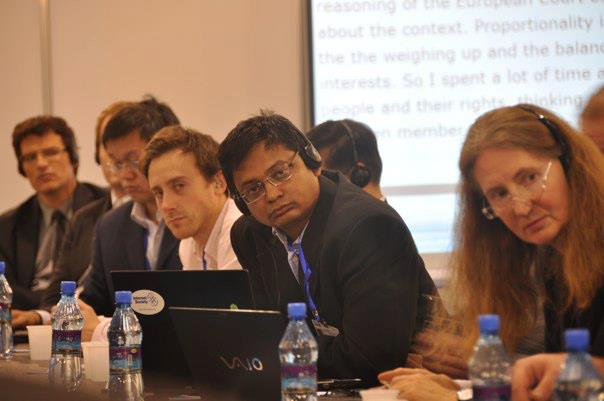
The 7th IGF has been the first IGF for me. However, before joining this important global event in person, I did not expect it to be such a captivating and fruitful conference. Perhaps, having finished the NGL e-Learning course on “Internet Governance” in a time when YouTube has been blocked in my country, I hit the sessions right on time.
From the very first day I was keen on knowing how to tackle cross border content issues. Content which is acceptable in one country/culture might not be acceptable in another country/culture. How to make decisions about the legitimacy of content? Who will decide? Is hate speech tolerable as freedom of expression? These were some of the questions that I wanted to put forward at the IGF. The first person with whom I had the chance to seek for the answers is none other than Vint Cerf himself. He explained the situation with a metaphor saying that the Internet is a river that flows through many countries and if it gets polluted in one place it may affect people in other countries. It was eye opening to get his insight about the complexity of this trans-border issue.
Later on, I was drawn to one of the workshops titled “Law Enforcement via Domain Names: Caveats to DNS Neutrality”. This session highlighted the growing trend of law enforcement through blocking content at the DNS level. I found the panelists highly competent to talk about this issue covering all different aspects. In response to my question about dealing with cross border content that becomes a public order issue, I was totally mesmerized when the panelists said “You know that in the universal declaration of human rights, there are exceptions on the basis of public order….I can tell you that for platforms, they explained to you that they’re caught between a rock and a hard place. They want to be faithful to due process. They want to be faithful to their own values and at the same time they’re receiving requests that they don’t really know how to handle because they have to make a determination which is becoming closer to what a judge does. This is not what the platforms want to do.” This statement simply echoed what I was thinking . Surely, this is one of the unsolved issues and it will continue to be on the agenda of Internet Governance Forum in the coming days. After this successful workshop I joined another two workshop which touched down this issue. The title of one of these was “ Internet & Jurisdiction: What frameworks for cross-border online communities and services?” while the other one was “What is the Geography of Cyberspace?”. Both these sessions were extremely useful to me and shed some lights in my understanding of the issue.
One of the things I liked about the IGF is that it seemed to me as a melting place of ideas and people from different professional background and cultures. When I was not participating at the sessions/workshops I was busy meeting people whom I have never met before. Definitely, these contacts will be very helpful for me in the near future.
After coming back to my country with this stimulus and rich contacts, it seems to me that the sessions have not quite ended. As I read the local news today I found that the Government is going to implement a new system which will enable it to block content according to its own jurisdiction. However, the question remains the same: who is going to decide which content to block? Attending the IGF has clearly given me an edge over this issue. I know that it is not acceptable for the government to decide on their own which content should be filtered which is not. I am in a better position to advise the government that perhaps they should not resort to blocking, instead they should adopt a more holistic multi-stake holder approach to deal with this issue. Clearly, there should be more dialogue among the stake holders before making any Internet Governance decision. Perhaps, this is the essence of ‘enhanced co-operation’.
